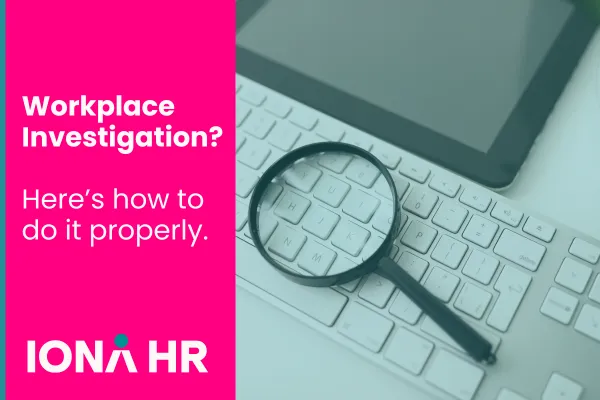
How to Handle a Workplace Investigation Without the Drama
Let’s say one of these lands on your desk:
An employee’s hurt themselves on shift
There’s money missing from the till
Someone’s raised a formal grievance
Whatever the issue, the next step is the same: a proper workplace investigation.
What is an investigation?
Think of it as fact-finding with purpose.
It’s not about blame. It’s not a disciplinary hearing.
It’s simply gathering information - so you can make an informed call on what to do next.
And here’s the thing most businesses get wrong:
They skip this stage altogether or do it too casually.
That’s how you end up with:
Decisions based on half a story
Unhappy teams
Accusations of unfair treatment
And legal risk if it all unravels later
A 5-step approach that actually works
1. Pick the right investigator
The right person makes all the difference.
You need someone:
Neutral (wasn’t involved in the situation)
Confident in investigations - or at least guided by someone who is
Patient and objective
In small businesses, that might mean pulling in someone external.
Fresh eyes. Clean slate. No bias.
2. Speak to everyone involved
The trick to good interviews? Preparation.
Plan your questions in advance (open, not leading)
Treat everyone the same
Take solid notes or record with permission
Let them bring a colleague if they want
Keep it calm, even if emotions run high
People will be nervous - understandably.
A calm, friendly, professional tone goes a long way.
3. Review the evidence properly
This isn’t a tick-box exercise.
You need to:
Separate fact from opinion
Spot patterns (or holes)
Refer back to policies
Weigh up credibility
Step back and see the full picture
This is where your judgement comes in - not assumptions.
4. Share the outcome clearly
Once you’ve got to the bottom of things:
Don’t delay - communicate promptly
Be honest and kind
Explain your reasoning
Allow space for questions
How you share the outcome matters just as much as the outcome itself.
5. Finish strong (records + follow-up)
The paperwork matters. So does the human bit.
Keep a record of every step taken
Check in with the people involved
Look for patterns - is there a policy gap?
Make improvements where needed
It’s not about covering your back. It’s about doing things properly.
Investigations don’t have to be awful
Handled right, they don’t drag on, descend into gossip or tear teams apart.
Handled badly… they do.
Here’s how to make it easier:
Set timelines and stick to them
Keep it confidential
Offer support to all sides
Focus on facts, not personalities
A structured approach protects your people and your business.
Need help?
Whether it’s a sensitive issue or a full-scale formal investigation, we can take the weight off.
Neutral investigator? Done.
Step-by-step guidance? Absolutely.
Someone to lead tough conversations? We’ve got it.
We run investigations properly - and quietly - so you can focus on leading your business.
Book a call if you’ve got a situation that needs sorting.
